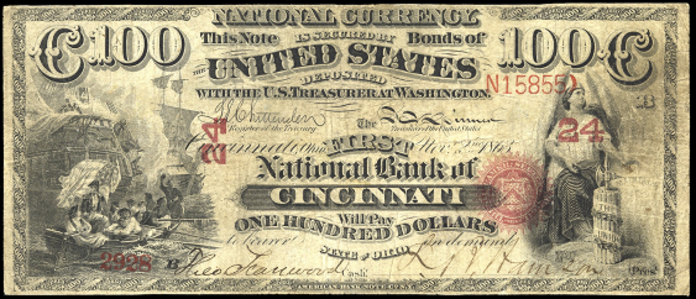One Hundred Dollar Notes › Nationals › 1863 One Hundred Dollar Original Series National Bank Notes › Michigan Charters › 1863 $100 South Haven Michigan First National Bank
Get Value Now
| Item | Info |
|---|---|
| Series | 1863 |
| Charter | #1823 First National Bank of South Haven, Michigan |
| Year Chartered | 1871, 153 Banks Chartered |
| City Info | South Haven is a city in the U.S. state of Michigan. Most of the city is in Van Buren County, although a small portion extends into Allegan County. The population was 4,403 at the 2010 census. Because of its position on Lake Michigan, at the mouth of the Black River, South Haven has always been a port city. During settlement, major ship lines stopped there, both passenger and freight. In the early 1900s South Haven became a resort town, sometimes referred to as "The Catskills of the Midwest". South Haven is a major regional tourist draw because of its recreational harbor and beaches. It is the western terminus of the Kal-Haven Trail, popular with bicyclists and snowmobilers. Nearby are Van Buren State Park and the Van Buren Trail State Park. Source: Wikipedia |
| Similar Cities | City name is unique, no others like it. |
| Seal Varieties | Red with rays |
| See Also | If your note doesn't match try: 1. 1863 $100 Compound Interest Treasury Note 2. 1864 $100 Compound Interest Treasury Note 3. 1863 $100 Gold Certificate 4. 1861 $100 Interest Bearing Note 5. 1863 $100 Interest Bearing Note 6. 1864 $100 Interest Bearing Note |
| Other Info | 1. Value depends on notes known for charter, condition and market demand. |
| Neat Fact | Issued in sheets of 4 Notes: 3 $50 Notes, 1 $100 Note. Also just 1 $50 Note & 1 $100 Note. Less commonly other combinations (Friedbergs, 20h Ed. P107) |
No Obligations Offers and Appraisals
Please submit a good photo or scan. It will be identified and evaluated. Understand there may be subtle differences between the image you see above and your note. Signatures, design, markings and note condition will determine the offer price. Notes in Uncirculated or better condition receive the best offers.
Appraisals can be estimated for wholesale and retail prices. Wholesale is what dealers typically pay. Retail is what a collector might pay. Retail is slightly higher in most cases.
Please visit this page for USA Paper Money Reference. Do not treat this page as a reference guide, it is for appraisal and acquisition purposes only.
